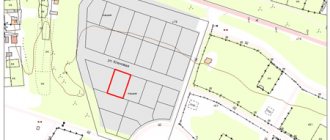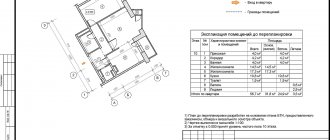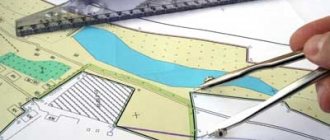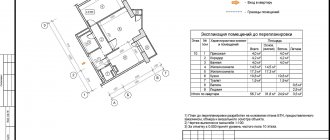Apartments are often remodeled. After all, standard developments cannot take into account the individual characteristics and wishes of a particular family.
Dear readers! The article talks about typical ways to resolve legal issues, but each case is individual. If you want to find out how to solve your particular problem , contact a consultant:
+7 (499) 938-81-90 (Moscow)
+7 (812) 467-32-77 (Saint Petersburg)
8 (800) 301-79-36 (Regions)
APPLICATIONS AND CALLS ARE ACCEPTED 24/7 and 7 days a week.
It's fast and FREE !
But not all changes in the floor plan can be approved by the relevant government bodies, for which the priority is not the convenience of living, but the safety of the buildings.
Therefore, to review the redevelopment project, a special commission is assembled, which decides the possibility of the transformations proposed by the owner.
What is this
The Interdepartmental Commission for the Redevelopment of Residential Premises is a state territorial body authorized to determine the compliance of planned work to transform the configuration of premises with legal and safety requirements.
Such commissions are created in each locality, and in large cities there may be several of them (each individual territory - district, district - has its own). Thus, Moscow has its own interdepartmental commission in each district of the city.
It is they who decide whether the redevelopment or reconstruction of the premises complies with a variety of standards: construction and technical, sanitary, hygienic, engineering, and safety standards.
This is determined by the documents that the owner attaches to the application requesting permission for the redevelopment.
Therefore, the more complete the package they are provided with, the greater the chances of receiving a positive conclusion from the International Inspectorate.
The process of consideration of the application by the commission is called redevelopment approval. Its result is either obtaining permission to transform in accordance with the project, or refusal to carry out this work.
Carrying out transformations in the configuration of the premises without prior approval is considered illegal and entails consequences for the owner (fine, requirement to return the premises to the original configuration).
What needs to be agreed upon
There are two types of work displayed in the table (for the first, as a rule, permission is always required, for the second - not):
| Redevelopment | Reorganization |
| Changing the configuration of the room (demolition of walls, combining a storage room with a room, blocking window/door openings) | Actions in which there is no need to amend technical documents |
| Actions for which it is necessary to change technical parameters in documents | Relocation of plumbing and electrical items |
| Creation of partitions and walls. They require permission, except for those that do not affect supporting structures and do not require amendments to the technical plan | Relocation of pipelines, ventilation |
| Creation of new, expansion or reduction of existing rooms | Replacing gas or electric stoves |
An approximate list of what you can do without approval:
- re-pasting wallpaper;
- replacement of floors, windows, doors;
- cladding of balconies;
- installation of air conditioners, antennas;
- replacement of plumbing fixtures, stoves, speakers, heating devices;
- glazing of balconies, loggias without changing the facades;
- sealing, increasing/decreasing doorways inside the apartment, except for inter-apartment and load-bearing ones;
- demolition and installation of non-load-bearing partitions that do not increase the load on the floors;
- moving the stove within the kitchen, replacing the bathtub with a shower.
It should be noted that, despite the unnecessaryness of approval, some actions require approval from other authorities, for example, when moving a kitchen stove, gas services are informed about this.
What laws govern
Since the interdepartmental commission is a state body, its creation and activities are determined by the relevant legislative acts:
- Decree of the Government of the Russian Federation No. 47 of January 28, 2006;
- Resolution of the State Committee of the Russian Federation for Construction No. 170 of September 27, 2003;
- resolutions of territorial government bodies (by district, city, locality).
The resolutions indicate the powers of this body, the grounds for creating the commission, and the directions of its activities.
On what basis is it created?
The MVK is collected on the basis of applications from the owners of residential or non-residential premises, which contain a request to allow construction and repair work related to changing their configuration.
Consideration of the possibility of carrying out work takes place solely on the basis of the project and permits attached to the application, therefore the owner must order documents for the MEC in advance.
There are cases when an application is submitted to the Ministry of Internal Affairs based on the fact of a redevelopment with a request to legalize it.
On such issues, the commission also has the authority to determine whether the transformations comply with all requirements and make both positive and negative decisions.
We identify the reasons for the notification to appear in Sberbank Online
Who can withdraw money from our account? These are either scammers or an erroneous transaction. Of course, any obligatory payments (on loans, payment for connected services) are not excluded, but Sberbank usually accompanies such actions with the message CH Debit RUS MOSCOW CH Debit RUS MOSCOW SBOL. It is most likely to suspect fraud in such a situation. But how can hackers get into our Sberbank Online and write off money from our account? Very simple. With the help of various viruses and malicious codes launched into the system.
Why is it necessary?
First of all, the need to contact the Intercontinental Inspectorate arises when the owner needs to obtain current documents for the premises (technical passport, cadastral passport, extract from the Unified State Register of Real Estate), in which redevelopment or reconstruction is planned or has been carried out.
Is it possible to legalize the redevelopment of a bath and toilet after renovation?
Do I need permission to redevelop a private house? Find out here. The powers of this commission include:
- recognition of the premises as meeting the requirements for housing premises;
- determining the project’s compliance with the requirements of legislative acts;
- determining the possibility of redevelopment, reconstruction or reconstruction of buildings;
- coordination of redevelopment projects and reconstruction of residential and non-residential premises;
- acceptance of transformations carried out in accordance with the project in the premises.
Filing an application to the MVK is an important stage in the legal registration of redevelopment.
Documentation
In addition to the conclusion on the condition of the residential building, the interdepartmental housing commission must also draw up a document that provides a market assessment of dilapidated housing. How much an apartment in a dilapidated building costs depends not only on the price of residential meters.
The assessment takes into account a whole list of expenses that the property owner incurs when moving him to a new apartment. It is necessary to include in the assessment the costs of rent before receiving a new home, registration of real estate, etc.
ATTENTION! The commission, taking into account the different indicators of the house's disrepair, may recognize it as suitable for living.
Residents can only either agree with this decision or protest it in court. The claim will be heard in a district court of general jurisdiction.
Source
Requested documents
Coordination of redevelopment with the Intercontinental Water Committee occurs by submitting a package of documents to this body:
- application in form No. 266, established by the Decree of the Government of the Russian Federation of April 28, 2005;
- title documents for the redevelopment object;
- redevelopment project, prepared and executed in accordance with the requirements for project documentation, the project must be agreed upon by the administration and various services (SES, fire supervision);
- registration certificate of the premises (taken from the BTI);
- permission from the body for the protection of historical, cultural, and architectural monuments (if the building belongs to this foundation);
- act on the technical condition of the building (if necessary, for example, when redeveloping a Khrushchev building);
- floor plan of the building.
The procedure for recognizing a house as unsafe by the interdepartmental commission
The duties of the commission do not include monitoring residential buildings or apartments in order to detect the emergency or dilapidated condition of the premises. Recognition of a house as unsafe is of a declarative nature.
This means that the homeowner or residents of the apartment building themselves must write an application and submit it to the local government authority. The submitted application is registered and transferred to the established interdepartmental commission.
When submitting an application, the applicant must provide the following documents:
- title documents for an apartment (house);
- statements, written complaints, letters that were addressed to the management company, but did not bring any results;
- conclusion of a specialized organization that conducted a survey of the house.
After registering the application, the commission organizes a meeting at which it determines the composition of the experts involved in this issue, organizes on-site examinations, inspections and tests.
After reviewing the application and the documents attached to it, the commission issues a decision on whether the housing is suitable for living in or not, whether there are grounds to believe that the housing is unsuitable for living in, whether the property is subject to reconstruction or whether it needs to be demolished.
After the commission issues the permit and all members of the commission (or a majority) sign it, the document is submitted to the local government, after which the competent authority issues an order indicating the further use of the house.
Is it possible to appeal the decision of the interdepartmental commission?
If residents are confident that their house is in disrepair and unfit for habitation, and the commission assures them of the opposite, then they have the right to appeal its decision. To do this, you need to write a statement and submit it to the Housing Inspectorate, the prosecutor's office or the court.
Cost of the service in 2021
How much does the procedure for recognizing housing as unsafe or dilapidated cost? The service is provided free of charge, so the applicant does not incur any costs.
Can they refuse to provide services if a residential premises is declared unfit for habitation?
The applicant may be denied services in the following cases:
- If the applicant is not the owner of the apartment.
- If he is not the legal representative of the apartment owner or the official tenant of the property.
- If the applicant has not provided the required documents.
- If the documents provided do not meet the requirements.
Can the interdepartmental commission cancel its conclusion?
The commission cannot cancel a previously issued conclusion on its own initiative. The court can cancel this decision after considering the claim from the interested party, which is the owner of the residential premises.
Interdepartmental commissions are created by local governments. The commission’s tasks include inspecting the technical condition of houses in order to determine premises unsuitable for living, as well as issuing an opinion on the technical condition of the house and the need to recognize it as unsafe and subject to demolition.
If the commission recognizes the housing as unsafe, then the residents of the house have the right to receive from the state other housing from the available housing.
General provisions of the interdepartmental commission on redevelopment
The work of the interdepartmental commission is based on the following provisions:
- only after the interdepartmental commission has made a positive decision on the application of the owner of the premises, the redevelopment becomes legal;
- the approval of redevelopment and reconstruction is carried out by the territorial intercontinental commission at the location of the facility;
- if for some reason the Ministry of Internal Affairs finds it difficult to make a decision on an application for redevelopment and reconstruction, its consideration is transferred to the commission for the use of housing stock;
- control over the subsequent redevelopment or reconstruction is assigned to one of the members of the commission for the approval of these transformations;
- a positive decision on the owner’s application cannot be made if the planned transformations weaken the load-bearing structures of the building and create a risk of harm to the life and health of citizens living in it;
- members of the commission can make adjustments to the redevelopment project if they consider it necessary; a positive decision will be made after the owner brings this document into compliance with the amendments.
List of documents for approval of redevelopment in MVK
- Application for redevelopment (filled out by an MFC employee);
- A document confirming the legal title to the premises - a notarized copy of the certificate of ownership or an extract from the Unified State Register of Real Estate;
- Premises redevelopment project in 2 copies
- Extract from the register of SRO design organizations;
- Design assignment;
- Technical passport for the apartment;
- Plans of above/below located apartments;
- Inspection report for ventilation ducts;
- Certificate of building status;
- Consent for redevelopment from the balance holder of the building;
- Minutes of the general meeting. In cases where common property is affected;
- Bank consent to redevelopment. In cases where the premises are pledged to a bank or under a mortgage.
Preparation and provision of all necessary documents is the key to successful approval!
Reasons for refusal of approval
The redevelopment commission may refuse to approve it on legal grounds.
Usually this is one of three points specified in the Housing Code of the Russian Federation, Chapter 4, Article 27:
- failure by the owner to submit for consideration important documents necessary to make a decision, while the refusal is issued only in cases where the applicant was notified of the lack of any documents, but did not provide them;
- the issue under consideration is not within the competence of the IMC;
- the documentation is not drawn up in the form prescribed by law.
Refusal to approve is issued in writing and sent to the applicant within a period not exceeding 3 working days from the date of the meeting of the Interim Committee.
It must be confirmed by references to relevant legislative acts that make it impossible to make a positive decision on the application.
The applicant has the right to appeal the refusal of approval in court.
Coordination of redevelopments in the Moscow Intercontinental Complex. Features and nuances
It must be remembered that in different regions of St. Petersburg there are different requirements both for the completion of design documentation and for the redevelopment itself. In one area, some planning decisions can be coordinated, but in another area - not.
MVK may refuse to approve the redevelopment not only on the basis of existing violations in the project documentation, but also if the applicant fails to provide a full package of accompanying documentation. The list of required documents is given below.
Redevelopment of non-residential premises is required to be approved by the Interregional Construction Committee only in the case where non-residential premises are located in residential buildings. If the non-residential premises are located in a non-residential building, for such cases there is a different procedure for legitimizing redevelopment.
Work algorithm
The interdepartmental commission works according to a certain algorithm, which is enshrined in legislative acts:
- after the owner submits an application, the commission meets and considers the possibility of approving this redevelopment;
- in case of refusal of approval, it is drawn up in writing and sent to the applicant;
- if a positive decision is made on the application, a corresponding act is drawn up, which is an important document for further registration and direct implementation of the redevelopment;
- the act is transferred to the territorial department of the Housing Commission for the preparation of other documents for registration of redevelopment.
Reviewing the question
To consider the issue, at the request of the owner, a meeting of the Intergovernmental Committee is scheduled.
A decision made by the commission is considered valid if 75% of its members are present at the meeting.
The meeting is chaired by the chairman of the municipal administration or his authorized representative.
The commission includes:
- head of the construction and housing and communal services department at the municipal administration;
- the head of the Department of Architecture and Urban Planning or his deputy (depending on the size of the locality, he can also be the head of the construction department);
- Head of the Department of Land and Property Issues;
- chief physician of the municipality;
- Head of OGPN (if necessary).
All documents submitted along with the application are reviewed at the meeting. The meeting is held both on the approval of redevelopment and on the application to legitimize the already carried out transformations.
If important documents are missing, a notice is issued to the applicant and the commission meeting is postponed.
What needs to be submitted for redevelopment
The standard package submitted for repair approval includes the following items:
- statement;
- documents confirming ownership (not always necessary, since this information is already in the Unified State Register);
- a project completed in the prescribed manner (done using a technical plan, a copy of which must be taken from the BTI). A copy and an original are submitted, since one sample is returned to the applicant after the procedure;
- consent of all permanently registered housing (for example, family members, etc.);
- They may also request a technical passport, an opinion from the authorities for the protection of architectural monuments, as well as a power of attorney if the procedure is carried out by an authorized person.
The most important thing in this list is the preliminary design and technical conclusion of the BTI.
Documents can be submitted not directly to the commission, but through the MFC.
Decision-making
When making a decision, the MVK takes into account the technical characteristics that the redesigned premises will meet, as well as how well it will meet sanitary, hygienic and safety requirements.
The decision on the issue is made by voting. For a positive resolution on an application, 50% of those voting plus 1 vote are required. In this case, at least 2/3 of all members of the commission must be present at the meeting.
If during the voting process there are the same number of votes “for” and “against”, then the decision for which the chairman of the commission voted is made.
In this case, the opinion of those members of the commission who spoke out against the decision made is documented in a separate protocol and attached to the general minutes of the meeting.
A positive decision of the commission is formalized in the form of an act. It must be approved by the head of the municipality at the location of the redevelopment object.
As a result of consideration of the issue of approval of redevelopment, the applicant receives the following documents:
- decision of the Ministry of Internal Affairs on the approval of planned construction and repair work on the premises;
- an extract from the resolution of the administration of the locality where the redevelopment object is located, approving the decision of the commission;
- one copy of the redevelopment or reconstruction project.
After this, the applicant can begin redevelopment work.
Drawing up a protocol
Minutes are required of the IAC meeting. The meeting secretary fills out the minutes.
Is the bank's consent required for redevelopment of a mortgaged apartment? What are the dangers of unauthorized redevelopment of residential premises in apartment buildings? Find out here.
What is residential redevelopment?
Read on. The protocol has an approved form and contains the following information:
- serial number;
- date of the meeting;
- number of commission members and its composition;
- agenda items;
- description of the premises - the object of redevelopment (its location, information about the owner, project number and details of the company that completed it are indicated here);
- the decision made (positive or negative) and its legal justification.
The protocol is signed by the chairman of the commission and the secretary.
Consideration of the issue of redevelopment by an interdepartmental commission is an important stage in its approval and the only legal opportunity to formalize all changes in the housing configuration.
You should not neglect this point of the law, so as not to have serious problems later.











